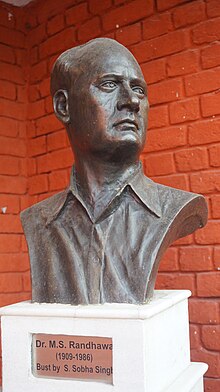M. S. Randhawa
| M.S. Randhawa | |
|---|---|

Bust of Dr Randhawa at the Chandigarh rose garden.
|
|
| Born |
Mohinder Singh Randhawa 2 February 1909 Zira, Punjab, India |
| Died | 3 March 1986 (aged 77) Kharar, Punjab, India |
| Residence | Kharar, India |
| Nationality | Indian |
| Alma mater | University of the Punjab |
| Occupation | Civil servant, art historian, algologist |
| Spouse(s) | Iqbal Kaur Randhawa |
| Children | Jatinder Singh Randhawa |
Mohinder Singh Randhawa or M. S. Randhawa (2 February 1909 – 3 March 1986) was a Punjabi civil servant, botanist, historian, art and culture promoter and prominent writer. He played major roles in the establishment of agricultural research in India, the Green Revolution in India, resettling Punjabis uprooted by Partition, establishing the city of Chandigarh and documenting the arts of Punjab, the history of agriculture in India. A biographer, Gulzar Singh Sandhu, gave him the sobriquet Punjab da Chhewan Dariya, the sixth river of Punjab.
Randhawa was born on 2 February 1909 at Zira, Ferozepur district, Punjab, India to Sher Singh Randhawa and Bachint Kaur who came from an affluent family belonging to the village of Bodlan in Hoshiarpur district. He received his matriculate from Khalsa High School, Muktsar in 1924 and his F.Sc., BSc (Hons.), and MSc (Hons.) in 1926, 1929 and 1930 respectively from Lahore. In 1955, he was awarded a Doctorate in Science by the University of the Punjab for his work on algae, especially on Zygnemataceae.
Randhawa joined the Indian Civil Service in 1934, then served in various capacities at Saharanpur, Fyzabad, Almora, Allahabad, Agra, and Rai Barelli until 1945, when he became secretary of the Indian Council of Agricultural Research (ICAR) for a year. He was associated with the ICAR through its initial years and made huge contributions to this pioneering organisation which was responsible for the Green Revolution in India.
...
Wikipedia
